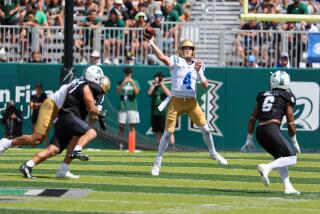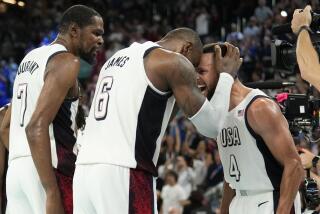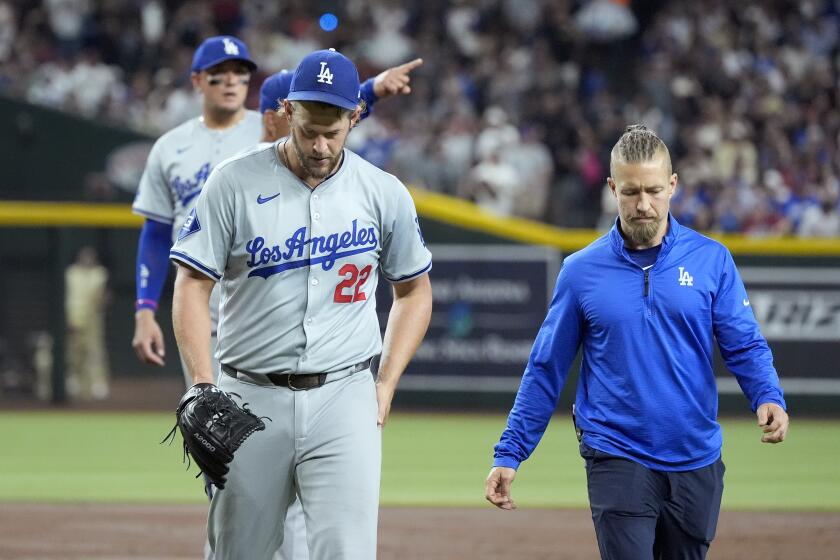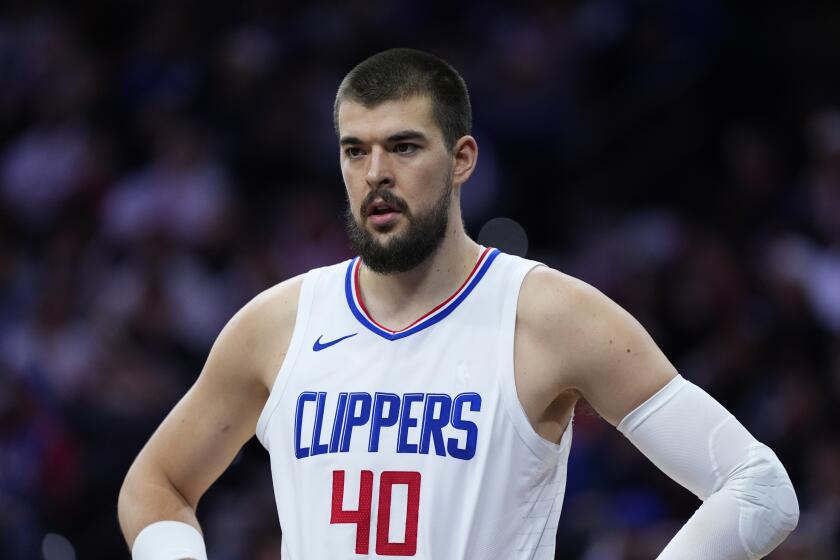Fowler Sets Deadline for Socker Investors : Indoor soccer: June 30 the day when San Diego finds out if it still has an MSL franchise.
Ron Fowler, Sockers owner for the past four seasons, on Monday announced he has been unable to secure majority investors for the club and that he is unable to continue absorbing losses that have been as much as $750,000 per season.
If a majority owner does not step forward by June 30, Fowler said the team that 12 days ago was likened to a tugboat winning the America’s Cup will sink in a sea of red ink.
More likely, however, is that the club, which moved here from Las Vegas in 1978, will relocate.
Earl Foreman, commissioner of the Major Soccer League, who was present at Monday’s news conference at the Sports Arena, said he has been talking to at least four out-of-town parties and that one has been very aggressive about moving the Sockers to its city.
Foreman would not identify the party or the city, but the possibilities are few.
At first, speculation centered on Buffalo, N.Y., where Seymour Knox, owner of the National Hockey League Buffalo Sabres, has been talking to the MSL and the National Professional Soccer League about expansion.
But George Bergantz, vice-president of marketing for the Sabres, said there have been no talks about moving the Sockers to that city.
“I’ve heard no proposal regarding the Sockers,” he said. “At this point, we’ve only looked at an expansion franchise.”
Joel Giambra, Buffalo city comptroller, who has been working with Foreman on MSL expansion, wouldn’t comment on a move by the Sockers to Buffalo, but said, “I’ve got a hunch that there will be soccer in Southern California next year.”
Which suggests another possibility.
According to one source the Sockers might follow the Clippers to the Los Angeles Sports Arena.
“Stuart Lichter (part owner of the Cleveland Crunch), who lives in Los Angeles, is looking to bring a franchise to the L.A. area,” the source said. “And I know he was in San Diego with some of his investors during the playoffs. What better scenario is there than to buy the San Diego Sockers?”
In weeks past Foreman has spoken of the L.A. Sports Arena as an almost certain expansion site for the 1992-93 season.
Lichter could not be reached.
Another possibility is Cincinnati, where management of the Riverfront Coliseum has been courting the MSL, but has had trouble attracting an owner.
Foreman also spoke of an out-of-towner that would keep the Sockers here, but that the individual is taking his time.
“It’s just the nature of the individual,” Foreman said. “It just takes him a long time to make his mind up. It also has been difficult dealing with him from a logistical standpoint.”
Foreman would not confirm or deny that he was speaking of Milan Mandaric, owner of the St. Louis Storm, who reportedly is interested in selling his majority interest in that team and buying the Sockers.
As far as being difficult to deal with logistically, Mandaric is traveling in Europe.
Coincidentally, he is scheduled to attend a banquet in St. Louis on Thursday, where he will be honored for keeping the MSL in that city.
Fowler is not out of the picture.
He said his first priority is to keep the team here and that he would like to maintain a 20% interest, as long as he does not incur more than $200,000 in debt each season. He said he has located other investors willing to pick up another 20%.
The team has won four of its nine championships since Fowler took control from Bob Bell four years ago. But its season-ticket base has eroded from 4,300 in Bell’s final season of stewardship to 2,200 this past season.
While the decline in season-ticket sales coincided with Fowler’s arrival, at least one front-office employee who was with the team in the mid-1980s said Fowler should not be blamed for the drop.
“We had a lot of continuity prior to the time Fowler took over,” said Randy Bernstein, vice-president. “Although we always had a lot of financial problems in the league, we always went on from year to year. We had the summer to sell season tickets.”
Bernstein said that with the revenue generated during the 1986-87 season coupled with today’s expenses, the team would be profitable. It is that thought that gives him confidence another owner or owners will be found to keep the team here.
“There’s definitely the potential for a break-even or money-making proposition here,” he said. “And this isn’t based on hopes and dreams. Just look at the old revenue and today’s expenses.”
Bernstein said sponsorship revenue also peaked in 1986-87 at $750,000, which is $70,000 more than the current salary cap.
Fowler and Bernstein both said that to get back to revenue levels of the mid-1980s, the league needs to stabilize.
“The biggest problem (with season-ticket sales this year) was that we got a very late start,” Fowler said. “It wasn’t until the end of July that we knew what was going on and uncertainty sure as heck doesn’t breed a successful season-ticket program.
“That’s one reason I hope to have this thing resolved by late June. At least that would give us three or four more weeks than we had last year. The other thing is if we could do this thing the way everybody wants to do it, we would be in the middle of a season-ticket campaign before the season’s over with and use the playoffs to generate some season tickets.
“Unfortunately because of our situation this year we didn’t. And unfortunately because on an annual basis in the spring there’s questions on the stability of the league, and we don’t (use that time to gain sales). But that’s when you should be generating season tickets for the next year.”
Fowler said there are signs the decline in season-ticket revenue has subsided.
“We’re ahead of where we were at this point last year in terms of renewals and deposits that are sitting in the account,” he said. “It’s beyond a thousand.”
The way Bernstein sees it, Fowler has suffered through four seasons of high six-figure losses and now is offering to give away four-fifths of the team.
“He’s saying he’ll pay off all back debt,” Bernstein said. “He’s figuring an operating loss of $750,000 for next year and he’s looking for four other people to come forward with $150,000. If he finds those four people, and if the team breaks even next season, that means the new owners would own 20% of the team with zero dollars lost.”
The only trouble being that the Sockers have never broke even.
Socker Notes
Money from season ticket holders who have already put down deposits for next year has been put in an escrow account and will be refunded if the team moves or folds, owner Ron Fowler said.
More to Read
Go beyond the scoreboard
Get the latest on L.A.'s teams in the daily Sports Report newsletter.
You may occasionally receive promotional content from the Los Angeles Times.






